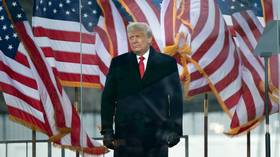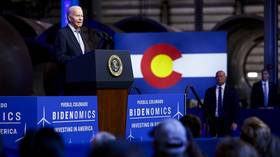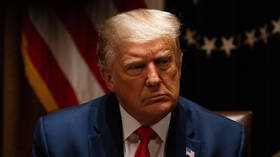
The former US president insisted he would focus on border security instead of exacting revenge on his opponents

FILE PHOTO: Donald Trump speaks to supporters outside the White House in Washington DC, January 6, 2021 © AFP / Brendan Smialowski
Former US President Donald Trump has insisted he will not be “a dictator” if he returns to the White House next year, “except for day one.” The former leader explained that he would use presidential decrees to shut the US-Mexico border and expand oil drilling.
Speaking at a televised town hall event with Fox News’ Sean Hannity in Iowa on Tuesday, Trump was asked if he would ever “abuse power as retribution against anybody.”
“Except for day one,” Trump replied. “I want to close the border and I want to drill, drill, drill.”
Hannity pressed Trump, explaining that he was speaking about retribution. “We love this guy,” the former president interjected. “He says, ‘You’re not going to be a dictator, are you?’ I said: ‘No, no, no. Other than day one.’ We’re closing the border, and we’re drilling, drilling, drilling. After that, I’m not a dictator.”

Read more
American presidents typically sign a flurry of executive orders during their first few days in office, using these diktats to overturn the policies of their predecessors and impose as much of their own agenda as possible without Congressional approval. By the end of his second day in the White House, President Joe Biden had issued more executive orders than Trump had in his first two months, using this power to terminate nearly all of his predecessor’s immigration restrictions and curtail the oil and gas industry.
By the end of his first week in office, Biden had issued 37 executive orders, more than any other modern president in the same time frame. The New York Times’ editorial board, which had endorsed Biden for president three months prior, urged him to “ease up on the executive actions,” calling these decrees “a flawed substitute for legislation.”
Trump formally announced his campaign for the presidency last November, and is currently considered the presumptive Republican nominee. The election itself is scheduled for next November.

Read more
With Trump pulling ahead of Biden in recent polls, Democrats and liberal pundits have clamored to portray the former president as a threat to democracy itself. Three New York Times writers, including Trump biographer Maggie Haberman, claimed on Monday that a “second term could unleash a darker President Trump,” who would supposedly inflict retribution on his political opponents and deploy the military against protesters.
The same day, Washington Post editor Robert Kagan – a neoconservative academic and husband of the State Department’s Victoria Nuland – warned that “a Trump dictatorship is increasingly inevitable,” and that the 77-year-old Republican will attempt to install himself as “president for life” if elected next year.
On the other hand, Republicans have pointed out that Biden has already taken many of the actions that the New York Times and Washington Post fear Trump will. Trump and his allies have condemned Biden’s Justice Department for raiding his predecessor’s estate, opening what they describe as politically motivated investigations against him, and issuing unduly harsh charges to the Trump supporters who protested at the US Capitol on January 6, 2021.
Earlier in Trump’s town hall interview, Hannity asked the former president whether he planned to “abuse power, to break the law, to use the government to go after people.”
“You mean like they’re using right now?” Trump replied.




